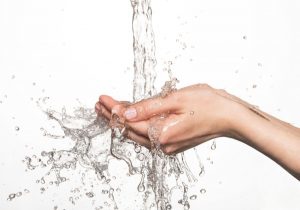
Drinking water is something we often take for granted in the U.S. We turn on a faucet in our home and out pours potable water. But a large number of homes in the country face trouble with hard water, which is water that contains a high level of mineral content suspended in it. Hard water minerals include calcium and magnesium—the primary causes of hard water—as well as aluminum, barium, iron, zinc, strontium, and manganese.
All those minerals may sound a bit concerning when you read about them. If your home has hard water, does it pose a significant health risk to your family? And is there anything you can do about getting rid of it?
The Health Concerns of Hard Water
We’ll start with the good news. According to the World Health Organization, hard water has no known negative health effects. Hard water minerals are naturally occurring in many foods and drink, and some are even beneficial, such as calcium. There may even be benefits for people who suffer from cardiovascular illness and types of cancer, although the studies are still inconclusive. Other types of water contaminants that may be associated with hard water are what create health troubles. The presence of aluminum may have a connection with Alzheimer’s disease, but this is also not proven.
So in general, hard water may provide health benefits, has a small and unproven chance of causing health complications, but otherwise isn’t harmful to drink.
But you still need to eliminate it from your house.
Why Treat the Water if Hard Water Isn’t Dangerous?
It’s not dangerous to you or your family. But it’s a serious problem for your home’s plumbing, fixtures, clothing, dishes and glasses, and your general cleanliness.
- Hard water minerals create scale inside plumbing pipes. This build up along the inside of the pipes will gradually lower the water volume and lead to an increase in water pressure throughout the plumbing, a rise in clogs, and a greater frequency of leaks.
- The scale from hard water is a major problem for water heaters as well as other water-using appliances. The scale inside a water heater tank can cause it to overheat, and it can quickly break a tankless water heater.
- Hard water makes it difficult to create soap lather. This makes it more difficult to clean and wash and makes both the dishwasher and the laundry machine less effective.
- Because soap doesn’t dissolve well in hard water, it leaves a soap scum residue on surfaces, hair, and skin. You’ll see a filmy substance on glass surfaces and glass wear. Hair will feel limp and skin will dry and itchy.
The way to solve the problems with hard water is to arrange for the installation of a water softener for your home. Water softeners exchange the hard water minerals for sodium, which “softens” the water. You must work with professionals experience with water treatment systems in Frederick, MD to find the right water softener for your needs. Call us today and we’ll see you have your hard water problems solved.
Mallick Plumbing & Heating is the Service Contractor of Choice in Maryland, Virginia, and the District of Columbia.
